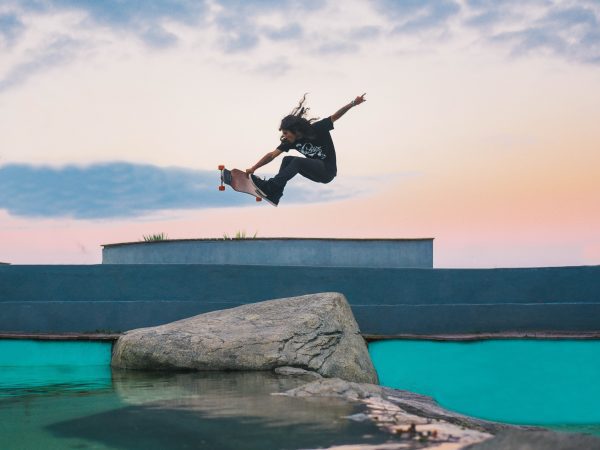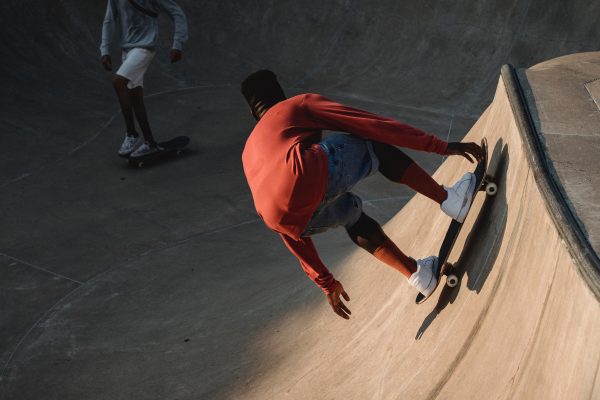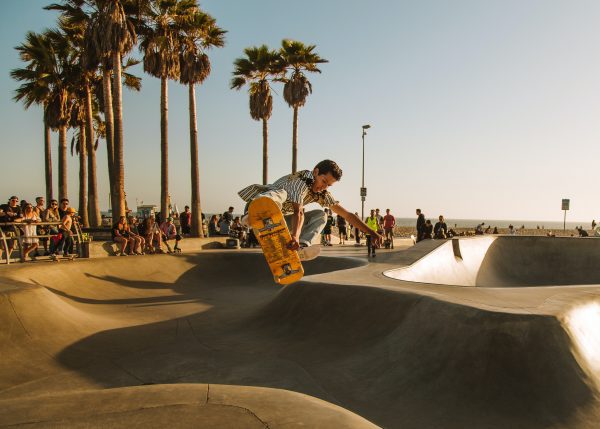Are you ready to take your skateboarding ability to exhilarating new heights? It’s time to move forward to an exciting journey of expert skate training.

In this article, we’ll delve deep into the world of extreme longboarding, equipping you with the knowledge, techniques, and mindset needed to push boundaries and achieve feats you once deemed impossible in skateboarding. Skateboarding is more than just a sport; it’s a way of life, an art form that allows individuals to express themselves through fearless, gravity-defying directions.
Skating safety is paramount, and we’ll stress the importance of skateboard lessons (private lessons), proper protective gear, and injury prevention strategies in skateboarding. We’ll also explore the significance of conditioning and fitness to ensure your body is primed for the rigors of longboarding.
Whether you dream of conquering half-pipe or advancing in skating, our guide to skateboarding lessons will teach you advanced skateboarding maneuvers. So, lace up your sneakers and get ready to advance.
Private Skate Lessons
- Private sessions can help you master basic skateboarding lessons before attempting advanced and intermediate skate tricks.
- Prioritize skating safety during class by wearing proper protective skate gear and adopting injury prevention strategies even when practicing at home.
- Focus on conditioning and fitness to improve your skating endurance.
Advancing Your Skating Progress
Pushing your limits in skateboarding requires dedication to embrace challenges, including getting some serious air with impressive tricks like heelflips. Here’s a deep dive into pro skating classes to help you reach new heights and have the best skateboarding experience.

- Master the Fundamentals: Before diving into advanced techniques, ensure you have a solid grasp of the skateboard fundamentals like balancing, pushing, turning, and stopping. A strong foundation is crucial for advanced maneuvers. This is why skateboarding lessons are so important.
- Set Clear Goals: Define specific, measurable, achievable, relevant, and time-bound (SMART) goals for your skateboarding advancement. Whether learning a new trick, improving your consistency, or mastering a certain terrain, clear goals will keep you focused.
- Safety First: Advanced skateboarding can be risky, so prioritize safety. Always wear appropriate safety gear like a helmet, knee pads, elbow pads, and wrist guards. Warm up properly before each session to reduce the risk of injuries.
- Conditioning and Fitness: Skateboarding demands physical strength and endurance. Incorporate regular conditioning exercises like squats, lunges, core workouts, and cardiovascular training to enhance your overall fitness and improve skateboarding performance.
- Stretching and Flexibility: Stretching is crucial for maintaining flexibility, which can aid in preventing injuries and help you achieve better kickflip tricks and maneuvers.
- Explore online tutorials and learn from expert instructors: Study social media videos of professional skateboarders and expert instructors performing the skateboarding tricks you want to learn. Analyze social media videos of their techniques, body positions, and foot placements to understand the mechanics better. Some people learn better with video references.
- Progressive Learning: To make the most out of skateboarding lessons, break down advanced tricks into smaller, manageable steps. Work on mastering individual components before putting them together for the full trick.
- Practice Regularly: Consistency is key. Skate as often as possible, ideally every day or several times a week, to develop an impressive array of skills. Repetition helps build muscle memory, which is essential for mastering complex maneuvers.
- Pushing Boundaries: Gradually push beyond your comfort zone. Attempt tricks that feel slightly challenging, but still within your capability. As you become more confident, take on progressively more difficult tricks.
- Practice Different Terrain: Don’t limit yourself to one type of terrain. Skate on ramps, rails, stairs, banks, and various surfaces to improve your versatility and adaptability as a skateboarder. You may also try the coaching facility available in your area.
- Film Yourself: Record your skate sessions and review the footage. It allows you to spot areas for improvement and track your progress over time. It also helps you become more comfortable learning new maneuvers.
- Visualize Success: Mental preparation is crucial. Visualize yourself successfully executing tricks before attempting them. Positive visualization can boost your confidence and focus so you can finally show off your new skills.
- Learn How to Fall: Falling is an inevitable part of skateboarding lessons. Practice falling correctly to reduce the risk of injury. Knowing how to fall safely can help you build confidence when trying more challenging maneuvers.
- Get Creative: Skateboarding is an art form, so don’t be afraid to get creative and invent your tricks or add your style to existing ones.
- Rest and Recovery: Skating is physically demanding. Allow your body sufficient time to rest and recover between intense sessions to avoid burnout and reduce the risk of injuries.
- Supportive Skate Community: Surround yourself with a good support group and fellow skateboarders who inspire and motivate you. Share knowledge, learn from each other, and encourage one another to progress.
Remember, longboarding is about enjoyment and personal growth. Embrace the journey, celebrate your achievements, and discover new limits with free skateboard lessons. With dedication and perseverance, you can achieve remarkable progress in pro-longboarding coaching.
Conclusion
Pro skateboarding classes are a journey that goes beyond mastering tricks. Throughout this article, we’ve explored the basics and technique – the essential elements that contribute to pushing your limits and unleashing your true potential as a rider.

Advancing in skateboarding entails several aspects such as skate safety, wearing protective gear and adopting injury prevention strategies, as well as building a strong skating foundation. It’s also important to maintain skate fitness, know your strengths and weaknesses, build endurance, and stretch every training. We also recommend breaking down complex tricks into manageable components to build muscle memory and steadily elevate your skills.
Skateboarding is not just about technical prowess; it’s an art form that allows you to express your unique style and creativity. Embracing this creative aspect can elevate your skateboarding to a whole new level, setting you apart as a true individual in the skate community. A united skateboarding community can be deeply inspiring.
As we conclude, remember that pro skateboarding training is not about perfection; it’s about embracing the process, learning from both successes and failures and continuously evolving as a rider and as an individual. Whether you choose to take classes with other students or prefer one-on-one sessions with the instructors, consistency is key. There are tons of programs you can choose from.
So, embrace the thrill of the ride, the sound of the wheels rolling, and the rush of adrenaline as you push your limits. This is your opportunity to unlock your true potential, redefine what’s possible on four wheels, and leave an indelible mark on the world of skateboarding.
Now, let’s hit the skate park, conquer those new tricks, and inspire others to join us on this incredible journey of advanced longboarding. Here’s to the boundless adventure that awaits us all! Skate on!
Frequently Asked Questions (FAQs):
Last Updated on July 3, 2024 by Harold Chan
DISCLAIMER (IMPORTANT): This information (including all text, images, audio, or other formats on FamilyHype.com) is not intended to be a substitute for informed professional advice, diagnosis, endorsement or treatment. You should not take any action or avoid taking action without consulting a qualified professional. Always seek the advice of your physician or other qualified health provider with any questions about medical conditions. Do not disregard professional medical advice or delay seeking advice or treatment because of something you have read here a FamilyHype.com.